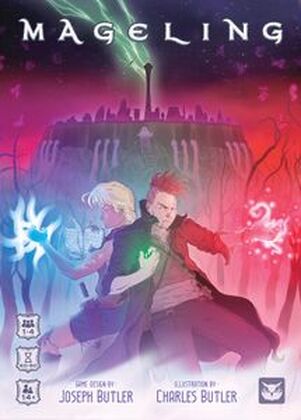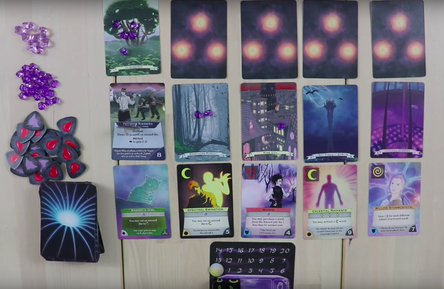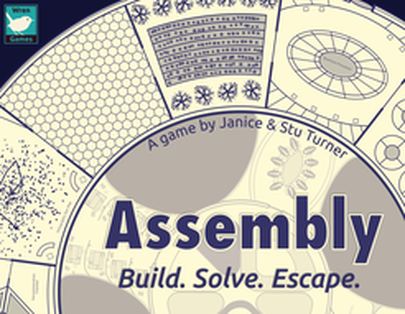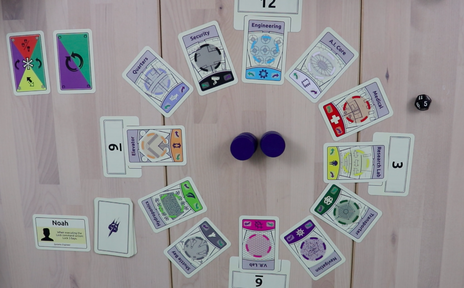 Image from BGG page. Image from BGG page. Full disclosure: Familiar Games sent me a review copy of Mageling. What is this game about? Mageling is a dice-rolling, tableau-building game about young mages who must travel through dangerous locations. The multiplayer game is essentially a race to be the first to traverse each of five different locations in Mageling's world. However, moving to new locations costs energy—more than your character will be able to generate at the start of the game. So you'll have to grow your powers and use them wisely. Each turn, you will roll five dice, and then be allowed to re-roll as many of those dice as you like. Then you'll need to decide what to do with the dice you've rolled. Each die face will display the symbol of either a school of magic in the game or a "finesse" symbol, which is a hand. If you have multiple dice of the same type, you can build up energy and us it to buy cards from a market row—as well as to potentially activate a card in that market row without actually buying it. You can also use pairs of dice to gain mana, which is energy you can keep from turn to turn, or use finesse to remove cards from the market (and, in solo mode, to activate a special ability). As you acquire cards, you'll be able to use your dice to trigger card abilities in addition to these basic actions, and the fun of the game is in acquiring effective combinations of cards. You'll also need to spend your energy to move from location to location, which can be expensive and which can trigger some surprising side effects. How does it play solo? Mageling has a solo/co-op mode that keeps the core of the game intact, while adding elements that keep things challenging. Rather than race other players to the end, in solo mode, players are racing to get through every location before the Evertree—the first location in the game and your home base within the world of Mageling—runs out of life. There are ways to give extra life to the Evertree, but you are working against the clock, and there are Ancient Ones who will awaken throughout the game and try to stop you. The solo game is also played as a short campaign, where your race to save the Evertree gets more difficult and desperate in every chapter. At the same time, you'll gain access to a personal market of spells that you've handpicked, in addition to the market row that all players can access in every game.  A solo game set up, with ancient ones on the top row. A solo game set up, with ancient ones on the top row. Overall Thoughts Overall, Mageling is a good game, especially as a first entry from a new designer and publisher. My favorite thing about it is that the game rewards repeated play, which means that as you continue to play Mageling, you'll have new insights into what cards and combinations are most effective. There are multiple paths to victory, so learning how to work the game and see its possibilities is very enjoyable. I also like that there are multiple uses for both cards and dice, so you can choose how to apportion your resources and whether to use a card immediately from the market row—meaning you use it only once—or whether to expend energy to buy it for your tableau. I also personally like the way the solo campaign is done. It's meaty enough to make the game challenging, but not long enough to feel like a slog. It's also possible to just start a game at any chapter of the solo campaign, or to stop playing whenever you want. I'd say the campaign creates a sense of growth and deeper gameplay, but without a matching sense of obligation. Mageling is not, however, without its flaws. Because it is a dice game, you will have inevitable dead turns due to bad luck, especially early on, before you've acquired cards that let you make more of bad rolls. This issue can be exacerbated in solo mode, where the market doesn't fluctuate enough, which can leave you with cards you don't want and not much that you can do about it. Most vexing for me, however, is that Mageling is a good game with a rulebook that doesn't give the best first impression. I had to go to Familiar Games's website to check the FAQ, or onto BGG, to check multiple rules ambiguities, and I found that very frustrating. In a hobby where many players are constantly in search of novelty in games, where they want to play more games than they have time for, and where they move on quickly from games that aren't working, it's a big ask to expect that level of patience. Do I recommend it? Potentially. If you liked One Deck Dungeon and want a different game with a similar vibe, if you like dice games, and if you like discovering interesting card combinations, then you will like Mageling. Just be patient as you work through the rules at first. Overall Rating: 3.5 stars Rating Scale: 5 stars — I love it! 4 stars — I really like it. 3 stars — I like it. 2 stars — It's okay. 1 star — Meh.
4 Comments
 Full Disclosure: I received a review copy of Assembly from Wren Games. What is this game about? Assembly is a short, quick puzzle game set on a spaceship. After a deadly virus kills off most of the crew, you (and potentially one friend) have survived because of your natural immunity. The ship, however, wants to quarantine itself by making sure nothing makes it off the ship alive—and that includes you. There is hope, however! A partially-built ship remains on board, and if you can finish it up in time, you'll be able to escape. The puzzle of Assembly lies in manipulating module tokens so that you can lock them into place on the correct cards (they will have matching symbols). To do this, you'll play through your deck three times, only using one card at a time to deploy modules, rotate them, swap them, or lock them into place. If you can finish locking the modules by the end of the third cycle through your deck, you win. Otherwise, in space, no one can hear you scream—and you won't have any oxygen to scream with, anyway. In addition to some "malfunctions" in the base game, you can play with an expansion called Glitches, which adds difficulty by messing with your best-laid plans. Even if you win regularly, you can try to challenge yourself further by seeing how many cards you have left over at the end—and there is a score chart to help you determine how well you did. How does it play solo? Assembly has both a solo mode and a two-player co-op mode. Solo works very smoothly—you just draw a card, play a card, and reshuffle or manage malfunctions as needed.  All laid out. All laid out. Overall Thoughts I have mixed feelings about Assembly. I'll start by saying that there are definitely a lot of things to appreciate about it. The gameplay is very smooth, the puzzle is fun to complete, and it's a quick game with a small footprint. I genuinely enjoyed my plays of Assembly, and I would absolutely try another game from the same designers. Janice and Stu Turner have worked together to form Wren Games, and I think that Assembly is a very good early outing from a small, independent publisher. I also feel, however, that Assembly is a little too easy. Once you get used to the basics of solving the puzzle, you will generally win the game unless you get incredibly unlucky. That means that after enthusiastic initial plays, I burned out on the game too quickly. I also found that while you can challenge yourself to reach higher performance levels in the game, your high score will ultimately depend more on luck of the draw than on your skill in the game. A lot of the more difficult in-game achievements depend on a lucky draw or shuffle—something that I didn't find satisfying. I do suspect that Assembly shines brightest as a two-player cooperative game, rather than as a solo puzzle. The co-op version of this game has some interesting communication restrictions that I think might really give the game some teeth. Do I recommend it? If you want a small, quick puzzler from an independent design team, then maybe. Especially if you plan to play the game solo and co-op. Assembly is truly snappy and fun. But it's not one for the ages. Overall Rating: 3 stars 5 stars — I love it! 4 stars — I really like it. 3 stars — I like it. 2 stars — It's okay. 1 star — Meh. |
AuthorMy name is Liz Davidson, and I play solo board games. A lot of solo board games... Archives
August 2021
Categories
All
|
 RSS Feed
RSS Feed